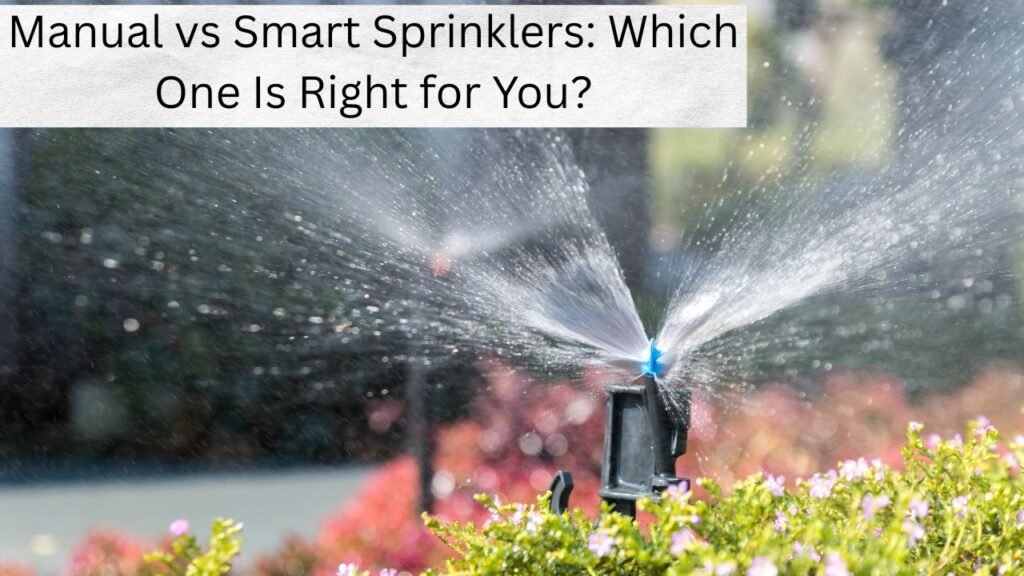Introduction: Making the Right Choice for Your Landscape
Choosing between manual and smart sprinkler systems is a significant decision for homeowners across the United States. While manual systems offer simplicity and lower upfront costs, smart sprinklers provide automation and potential long-term savings. This guide will help you understand the differences, benefits, and drawbacks of each system to determine which is best suited for your landscape needs.

Understanding Manual Sprinkler Systems
What Is a Manual Sprinkler System?
Manual sprinkler systems require homeowners to control watering schedules and durations manually. This often involves setting timers and physically adjusting sprinkler heads.
Pros and Cons of Manual Sprinkler Systems
Advantages:
- Lower Initial Cost: Manual systems are generally less expensive to purchase and install.
- Direct Control: Homeowners have hands-on control over watering schedules.
- Simplicity: These systems are straightforward to understand and operate.
Disadvantages:
- Time-Consuming: Requires regular manual adjustments, especially with changing weather conditions.
- Inefficient Water Use: Higher risk of overwatering or underwatering, leading to potential water waste.
- Limited Features: Lacks advanced features for optimizing water usage.
Ideal Scenarios for Manual Systems
- Small Yards: In smaller spaces, manual watering is manageable and cost-effective.
- Budget Constraints: For those prioritizing initial cost savings, manual systems are a viable option.
- Hands-On Gardeners: Individuals who enjoy actively managing their garden’s watering schedule.
Exploring Smart Sprinkler Systems
What Is a Smart Sprinkler System?
Smart sprinkler systems utilize technology such as Wi-Fi connectivity, weather data integration, soil moisture sensors, and smartphone apps to automate and optimize watering based on real-time conditions and specific plant needs.
Pros and Cons of Smart Sprinkler Systems
Advantages:
- Water Efficiency: Automatically adjusts watering based on weather forecasts and soil moisture, reducing water waste.
- Convenience: Remote control via smartphone apps allows for easy management.
- Long-Term Savings: Potential to save on water bills over time.
Disadvantages:
- Higher Initial Cost: Smart systems are more expensive to purchase and install.
- Technical Complexity: May require a learning curve to set up and operate effectively.
- Dependence on Technology: Relies on internet connectivity and power supply.
Ideal Scenarios for Smart Systems
- Large or Complex Landscapes: Efficiently manages multiple zones with varying watering needs.
- Busy Homeowners: Automated scheduling saves time and effort.
- Water Conservation Goals: Ideal for those aiming to reduce water usage and promote sustainability.
Comparing Features: Manual vs. Smart Sprinklers
| Feature | Manual Sprinkler Systems | Smart Sprinkler Systems |
|---|---|---|
| Initial Cost | Lower | Higher |
| Water Efficiency | Depends on user diligence | High; adjusts based on real-time data |
| User Effort | High; requires regular manual adjustments | Low; mostly automated |
| Convenience | Basic timer functionality | Remote control via apps; integrates with smart homes |
| Customization | Limited | High; zone-specific programming and scheduling |
| Maintenance | Simple; fewer components | May require software updates and technical troubleshooting |
Key Considerations to Determine the Right System for You
1. Budget Constraints
If you’re looking to minimize initial expenses, a manual system is more affordable upfront. However, consider potential long-term savings with a smart system, which can reduce water bills over time.
2. Time Availability
Manual systems require regular attention to adjust watering schedules, especially with changing weather. If you prefer a set-it-and-forget-it approach, smart systems offer automated scheduling and remote management.The Spruce
3. Landscape Size and Complexity
For larger yards with multiple zones, managing watering manually can be cumbersome. Smart systems efficiently handle complex landscapes with tailored watering schedules for each zone.
4. Technological Comfort Level
If you’re comfortable using smartphone apps and integrating devices into your smart home ecosystem, a smart sprinkler system can enhance convenience and control. Otherwise, a manual system might be more suitable.
5. Water Conservation Goals
Smart sprinkler systems are designed to optimize water usage, making them ideal for environmentally conscious homeowners aiming to reduce their water footprint.
Smart Features That Matter
- Weather-Based Adjustments: Automatically skips watering during rain or adjusts schedules based on forecasts, conserving water.AM22Tech
- Soil Moisture Sensors: Ensures watering only occurs when soil moisture levels are low, promoting plant health.
- Zone-Specific Programming: Allows different areas of your landscape to receive customized watering schedules.
- Remote Control via App: Manage your sprinkler system from anywhere, providing flexibility and convenience.
- Integration with Smart Home Platforms: Compatible with systems like Alexa or Google Assistant for voice control.
- Water Usage Monitoring: Provides insights into water consumption, helping identify areas for improvement.Business Hub
- Leak Detection: Alerts you to potential issues, preventing water waste and damage.
- WaterSense Certification: Indicates the system meets EPA criteria for water efficiency and performance.
When Manual Systems Still Make Sense
Manual sprinkler systems are suitable for:
- Small Yards or Gardens: Easier to manage watering schedules manually.
- Budget-Conscious Homeowners: Lower initial investment compared to smart systems.
- Hands-On Gardeners: Those who enjoy actively managing their garden’s watering needs.
However, even in these scenarios, it’s essential to monitor watering schedules to prevent over or under-watering.
Final Verdict: Which System Is Right for You?
- Choose a Manual System if:
- You have a small yard or garden.
- You’re looking for a lower upfront cost.
- You prefer hands-on control over your watering schedule.
- Opt for a Smart System if:
- You have a larger or more complex landscape.
- You’re aiming to conserve water and reduce utility bills.
- You value convenience and remote management capabilities.Time+13Austex Sprinkler+13House Digest+13
Ultimately, the decision depends on your specific needs, preferences, and resources.